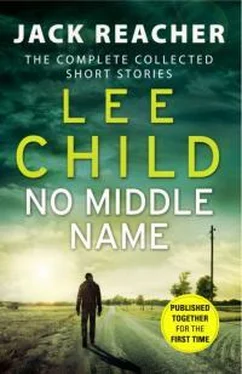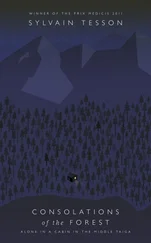Henry slowed the van and the road curved to the left and came out in a clearing about the size of a football stadium. Dead ahead was a lake shaped like a crooked finger, first pointing north and then curling east. The road became a kind of Main Street leading straight to the shore. At the far end was a kayak pier, and left and right were low wooden buildings, with vacation cabins near the water, and a general store and a diner and small residences further from it. There were side streets made of the same battered grey blacktop. Naismith, Maine. A miniature town, in the middle of nowhere.
Suzanne said, ‘I’m hungry.’
‘I’ll buy lunch,’ Reacher said. ‘That’s the least I can do.’
Henry parked the van in front of the diner and shut down the motor. The world went silent. They all climbed out, and they all stood and stretched. The air was somewhere halfway between fresh and heavy, the tang of the lake water mixed with the smell of the trees, and there was no sound beyond a subliminal drone from a billion tiny insect wings. There was no wind, no rustling leaves, no lapping waves. Just hot stillness.
The diner was all wood, inside and out, rough stained boards worn shiny in places by hands and elbows and shoulders. There were pies in glass cases and eight square tables draped in red chequered tablecloths. The waitress was a flinty woman of about sixty, wearing a pair of men’s eyeglasses, and carpet slippers. Two tables were occupied, both by people who looked more like Henry and Suzanne than Helen. The waitress pointed to an empty table and went to get menus and glasses of water.
The food was the same as Reacher had eaten in a thousand other diners, but it was adequate, and the coffee was fresh and strong, so he was happy. As were the others, not that they were paying much attention to what they were eating and drinking. They were talking amongst themselves, running through their plans. Which sounded straightforward enough. They were all going to spend the night in pre-booked cabins, and at first light Henry and Suzanne were going to set out walking, and Helen was going to drive back to Route 11 and look for whatever she could find. Four days later they were all going to meet again at the far end of the trail. Simple as that.
Reacher paid the check, said his goodbyes, and left them there. He didn’t expect to see them again.
From the diner he strolled down to the kayak pier and walked out to the end of it, and stood with his toes above open water. The lake was a bright blue spear pointing north and then turning east into the distance, more than ten miles long, probably, but not more than a couple hundred yards across at its widest bulge. Overhead was a vast high bowl of summer sky, completely cloudless, unmarked except for wispy contrails eight miles up, from transatlantic jet planes heading to and from Europe, in and out of Boston and New York and Washington D.C. Great Circle routes, way up over Canada and Greenland, and then dropping down again to London and Paris and Rome. Straight lines on a spherical planet, but not on a flat paper map.
At ground level the forest crowded in on both sides of the lake, unbroken, a continuous green canopy covering everything that wasn’t liquid. There were hundreds and hundreds of square miles of it. Ten thousand years of undisturbed nature, Henry had said, which was exactly what it looked like. The earth had warmed, the glaciers had retreated, seeds had blown in, rain had fallen, and a hundred generations of trees had grown and died and grown again. Elsewhere on the giant continent people had cut them down to clear fields for farming, or for lumber to build houses, or to burn in stoves and steam locomotives, but some parts had been left alone, and maybe always would be. You could be the first human ever to set foot, Henry had said, and Reacher had no doubt he was right.
He walked back past the vacation cabins, which were all quiet. People were out and about in other places, clearly, doing whatever it was they were there to do. He found a turn to the left, which was basically north, where there was a hundred-yard side street, which he followed, and at the end of it he found a wooden arch, lashed together from bark-stripped trunks stained dark brown, like a ceremonial thing. A literal gateway to the wilderness. Beyond it the trail started. It ran straight for twenty yards, all beaten flat by booted feet, and then it turned a corner and disappeared. Next stop, the town called Cripps, four days away.
He stepped under the arch and stood still on the first yard of the trail. Then he moved forward, twenty paces, to the first turn. He took it and walked onward, another twenty paces, another twenty yards, and stopped again. The trail was about four feet wide. Either side the forest crowded in. The trunks were spiked with dead branches all the way to the canopy far overhead. The trees had grown tall and straight, racing for the light. They were two or three feet apart in some places, and more or less touching in others. Some were ancient and mature, all gnarled and burled and a yard across, and some were younger and slimmer and paler, exploiting the gaps, like opportunistic weeds. Below chest height the undergrowth was dense and tangled, a mess of dark-leaved thorny runners snaking among dry and brittle twigs. The air was still and completely silent. The light was green and dim. He turned a full circle. He was forty yards from the ceremonial arch, but he felt like he was a million miles from anywhere.
He walked on, another twenty paces. Nothing changed. The path wandered left and right a little. He guessed some kind of parks authority kept the underbrush trimmed back, and left it to passing feet to crush new seedlings. He guessed without that kind of human intervention the trail would close up in a year or two. Three, tops. It would become impassable. Reclaimed by nature. He guessed wider bulges had been hacked out here and there, for camp sites. For the pup tents. Near streams, maybe. There was nowhere else to sleep the night.
He stood for a minute more, in the green filtered light and the eerie silence. Then he turned around and walked back to Naismith’s token Main Street, and he followed it out the way they had driven in, to the board sign on the shoulder, with the welcome. But there was no traffic leaving town, and after a moment’s reflection he realized there wouldn’t be, not until the next morning. Presumably the check-out time for the vacation cabins was eleven or noon, which meant that day’s exodus was already over. The diner and the general store would need occasional deliveries, but the odds were long that a returning truck would be passing by any time soon. He stood in the heavy silence a minute longer, for no real reason other than he was enjoying it, and then he retraced his steps, through the town towards the lake.
The vacation cabins were laid out haphazardly, like a handful of dice thrown down. Reacher figured the location furthest from the water would be the least desirable, and sure enough found it was being used as some kind of a resident manager’s accommodations, with a front room done up as an office, with one of its window panes converted to an opening hutch, which had a shelf behind it with a little brass bell and a ballpoint pen on a chain. He rang the bell and a long moment later an old guy stepped up, slowly, like he had arthritis. Yes, he had vacancies. The overnight charge was a modest sum. Reacher paid cash and signed his name with the pen on the chain, and got a key in return, to what turned out to be a tiny wooden house that smelled hot and mouldy. Not a prime position, but it had a partial sideways view of the lake. The rest of the view was all trees, inevitably. There was a bed and two chairs, and a bathroom and kitchen facilities, and a short shelf with creased and battered paperback books on it. Outside in back there was a small deck with two folding chairs slung with faded and sun-rotted fabric. Reacher spent the rest of the afternoon in one of them, with his feet up on the other, reading a book from the shelf, warm, alone, relaxed, as happy as he could remember being.
Читать дальше











